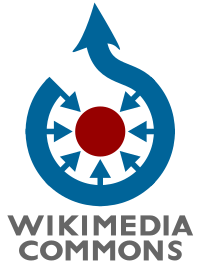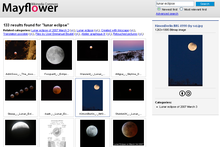Translation requests/WMF/Spotlight on Wikimedia Commons/ar
Spotlight on Wikimedia Commons
[edit]Template:Spotlight on Wikimedia Commons/Lang By Brianna Laugher, September 2007

- Name: Wikimedia Commons
- URL: http://commons.wikimedia.org/
- Licenses used: GFDL, CC-BY-SA, CC-BY, public domain, Free Art Licence, CeCILL
- Translations of the Main Page: 70
- Date founded: September 7, 2004
- Number of registered users: 191,174
- Number of administrators: 218 (0.1%)
- Number of media files: 1,819,667
- Database size: 953.7 GB
- Number of Featured Pictures: 945 (0.05%)
- Number of pages: 2,299,595 (second only to English Wikipedia among the Wikimedia Foundation projects)
- Strangest edit war: colours of the Italian flag (see the talk page)
- Confusion about a connection to Creative Commons: moderate
Welcome to Wikimedia Commons. "Commons" is, unfortunately, a little bit too common these days as far as naming projects go, but bear with us, because this project is anything but common. (And there's no official connection* to Creative Commons, iCommons, the House of Commons, or any other "Commons" except the abstract one.)
Founded just three years ago as a way to avoid uploading the same image to 200 different wikis, Wikimedia Commons began as a central media repository, making life more convenient for Wikimedia editors. Since then it has grown rapidly into a multilingual community of photographers, illustrators, scanners, audio editors, translators, organisers and annotators.
- 2006 Picture of the Year winners
-
Picture of the Year: Aurora Borealis, taken by U.S. Air Force Senior Airman Joshua Strang. Public domain
-
Second place: Sans domicile fixe in Paris, taken by User:Eric Pouhier. CC-BY-SA 2.5
-
Equal third: Blue Jay (Cyanocitta cristata), taken by User:Mdf. GFDL
-
Equal third: Hoverflies (Melangyna viridiceps) mating in midair, taken by User:Fir0002. GFDL
Although the vast majority of files uploaded are JPGs (photographs), the site also accepts audio and video files (OGG format), scanned images (DJVU) and other graphic formats including PNG and SVG. Video uploads are few, due to limited playback support for the OGG format. Audio uploads are mainly pronunciation files, servicing Wiktionary, and spoken Wikipedia articles. DJVU files are widely used by Wikisource.

The uptake of SVGs, Scalable Vector Graphics, has been impressive, with the format now being used for computer icons, detailed diagrams, and even road maps! Around 6% of the total number of files are files in the SVG format. (When the images are used in Wikimedia, the wiki software automatically creates PNG thumbnails, for greater accessibility.)
While comparable in depth and variety to stock photography or clipart archives (or even search engines like Google Images), Wikimedia Commons makes its mark as a project dedicated to only hosting freely-licensed media. Any free-content licence is accepted on the site as long as it allows for certain key freedoms, including commercial use and modification. These conditions are the closest to those of the GNU Free Documentation License, which is the licence of Wikipedia's text (and most Wikimedia Foundation projects). This means two of the Creative Commons licences are accepted: Creative Commons Attribution (CC-BY) and Creative Commons Attribution-ShareAlike (CC-BY-SA).
Another feature that distinguishes it from mere archives is the fact that anyone can contribute. Registering an account takes seconds and doesn't even require an email address. From there anyone can instantly upload freely-licensed materials. Wikimedia Commons is not just a collection of "original content" created by Wikimedia editors, but also a kind of "utility filter" on many other media collections on the web, including Flickr and public domain archives.
Wikimedia Commons' original focus as a convenience for Wikipedia has stood it in good stead. For starters, it acts as a discouragement to people who would upload blurry pictures of their shoelaces taken with a phone-cam. Can you imagine your picture on a specific Wikipedia article that exists today? If not, then it's probably not suitable for Wikimedia Commons.
Secondly, it acts as an encouragement to the obsessive annotative skills of the Wikipedian and their ilk. Broad, idiosyncratic tags are no good. What's the binomial Latin name for this insect? What date was this photo taken? Which book did this illustration come from? What's the geo-tag for the location of this plant? Thanks to the wiki software, if you don't know the species name, someone else can add it in later. Unlike static archives, everything is in a constant state of improvement.

With such rapid expansion, it's not surprising that sometimes it's hard to find what you're looking for. Luckily the Wikimedia Commons community has improvised, and there are several methods to finding high-quality results. The first one is the image search engine Mayflower, which is a vast improvement on the default text-based search. Try it and see!
Two more FYIs are "Featured pictures" and "Quality images". These are user-driven processes that recognise top-quality and high-quality images, respectively. Both are linked from the Main Page and offer hundreds, (nope, now it's thousands!) of high quality, well-annotated images.
If you think this all sounds rather interesting in a distant potentially-useful-one-day kind of way, then you might be interested in our Picture of the Day. You can check out one awesome free image each day via the website, RSS or a mailing list. If, on the other hand, you've already been mentally reviewing which of your photographs would look best on Wikipedia's front page one day, have a gander at our First Steps guide, along with useful tips on contributing your own work. We look forward to welcoming you to the community.
* There is no official connection between Wikimedia Commons, specifically, and iCommons or Creative Commons. However there are official connections between the Wikimedia Foundation and these groups: overlapping Board members. Jimmy Wales is on the Board of all three: Wikimedia Foundation, Creative Commons and iCommons. Heather Ford, the Executive Director of iCommons, is also on the Wikimedia Foundation Advisory Board.




